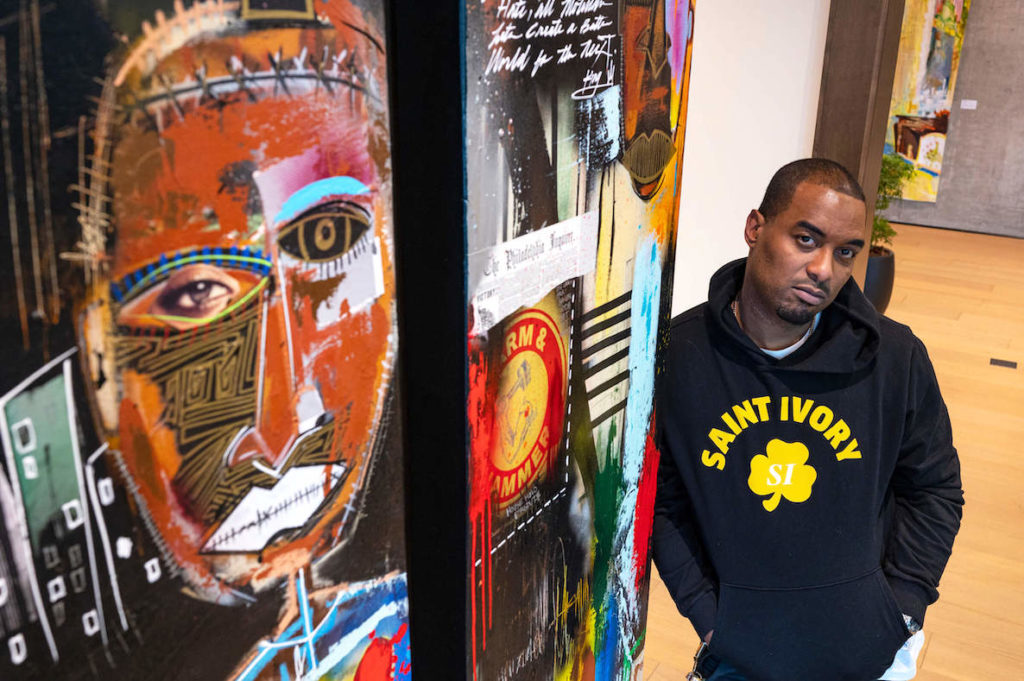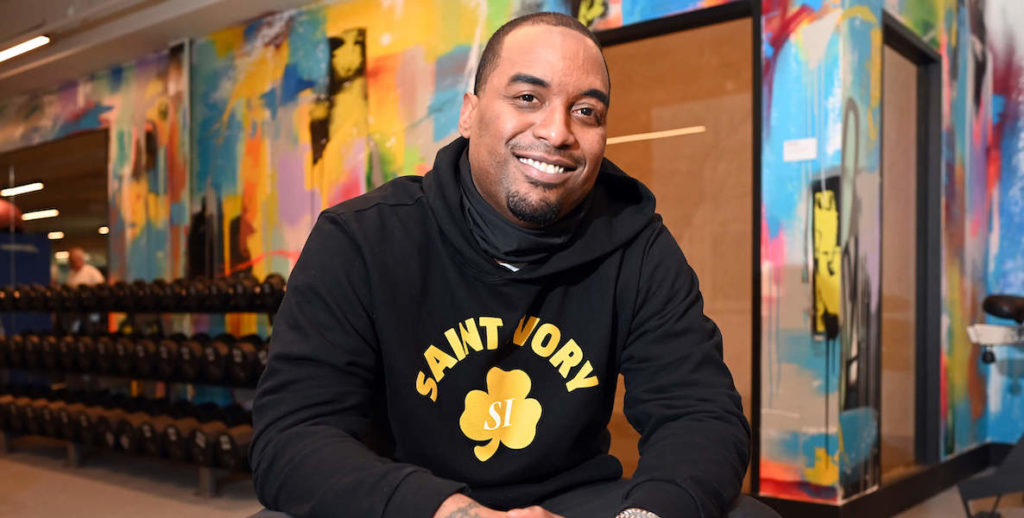Artist Raheem “King” Saladeen has made a name for himself around the world; worked with brands from the NFL to Nike, Mercedes and Topps and Beats by Dre; counts celebrity clients among those who collect his NFTs, figurines and paintings, which can run upwards of six figures. Locally, you can find Saladeen’s work at Fitler Club, at Boyds, even at the Philadelphia International Airport.
But the root of his work? That can best be traced back to the humble Elmwood Roller Skating Rink at 72nd Street and Grays Avenue.
It was there that, as a 12 year-old, the Southwest Philly native met his ultimate cheerleader, JP, the friend who would unlock Saladeen’s belief in himself and the art he’d been creating from the time he was just five, drawing on the walls of his Southwest Philly bedroom, his mom nurturing her only child’s wild imagination.
But the thing that sets you apart? That’s your superpower, what will change your life—and unleash the best of what Philly has to offer.
“You’d see everybody at the skating rink. And this one kid, JP, used to wear these Bill Cosby sweaters all the time. Can you imagine? Kids are wearing Nike-everything, and he’s got a Bill Cosby sweater on, every time!” Saladeen recalls, laughing. “One day, we started talking at the video games, and I’m like Why you always wearing those sweaters? And he says, ‘Cause I don’t want to dress like y’all! JP was always a little more leveled-up than us.”
The boys became fast friends and stayed that way, year after year, riding the same SEPTA line to their respective schools, seeing each other around the basketball courts where Saladeen played AAU ball for years before an injury sidelined him.
As they got older, being “regular” was the path JP continued to detest and wanted his best friend to avoid, too. So when, in their 20s, Saladeen established himself as a loan officer, a stable career guy? JP wasn’t having it. When the recession hit, and Saladeen lost that job and worked weekend hours at a local juvenile detention center? JP wasn’t having that, either.
RELATED: Arts can transform lives and cities. We should promote it wildly.
“Don’t be regular, Heem!” he’d implore his friend. “You’re not a regular 9-to-5 guy.” But Saladeen had never seen anyone make money from art. “My best friend saw so much in me, but I was just trying not to go to jail. Where I grew up, you just want to help your mom out, help your people out, secure your family. At school, they’d talk about careers and bring in a cop or a firefighter. But I didn’t connect with that, and anyone who made money from my neighborhood played basketball or football or rapped.”
Still, JP was willing to put his own money where his mouth was: If Saladeen would just give his art, which JP had seen him create over the years, a real chance, he’d front him $4,000 to get started.
“You would’ve thought someone was paying JP to be my hype man, that’s how much faith he had in me,” Saladeen says. And on July 4, 2011, fed up with everyone around him having cookouts and parties while he was working, Saldeen decided to walk from his “regular” life and take that offer.
And his alter-ego was born…

He got supplies at Blick and, from his mom’s garage, started painting what he knew: T-shirts, sneakers, jean jackets. “In the inner city, that’s what was appreciated. Everybody wanted a dope jacket, everybody wanted a dope outfit, some dope sneakers. Nobody cared about a painting in their house,” he says.
Then he reconnected with a close family friend, his “cousin” Barry, a lawyer in Miami, who took one look at the photos Saladeen sent of his art and implored him to fly down to meet with some wealthy potential customers in Florida.
Saladeen landed in Miami and didn’t waste a minute: customizing a motorcycle helmet here, selling flip-flops with his designs there, visiting galleries and taking in Art Basel. “It was an art dream world, and I’d had no idea it existed!” he says. Friends who’d moved out to L.A. heard about his art and invited him out west; there, he turned a friend’s wall into a de-facto gallery, and started hosting parties to showcase his work. While making fliers for one of the parties, a friend dubbed him “King Saladeen,” and his alter ego was born.
RELATED: 20 exciting emerging Black artists to watch in Philadelphia
It’s while he was in L.A. that Saladeen got a call from JP, who’d landed in the hospital with what he thought was an excruciating headache: It turned out to be stage-four brain cancer.
Saladeen sold a piece of art, a painting with a cartoon-like bear that JP had always loved, to cover the cost of a plane ticket home. Returning back east, he sat by his friend’s hospital bedside.
Less than three weeks later, JP died.
His passing left Saladeen bereft, but also emboldened: He started channeling his grief into his work, hearing his friend’s voice—all the life lessons he’d imparted to him—coaching him on. He christened that cartoon bear “JP the Money Bear,” and made him his signature, his brand, putting him on paintings and figurines.
“Everything that I’ve got came from Philly”
As Saladeen’s career took off, with millionaire clients in New York and invitations to collaborate with Nike, Mercedes, Beats by Dre, so too did his desire to give back: First, to cancer-related charities, like Philly Fights Cancer; he helped raise more than $500,000 to fund research and send children with terminal illnesses to camp. Then, he started his own foundation, Create Motivate Inspire, through which he’s distributed backpacks to children and food to families and, recently, launched an NFT to raise funds. Saladeen is also using new technologies to further benefit the community: Late last year, he worked with NTWRK and HubSpot to release a series of visual art NFTs, with proceeds being reinvested in his foundation.
“My work is about more than just profit, it’s about more than trying to be the best artist. It’s really about making kids and people who otherwise don’t care about art feel something. And in a spiritual way, it’s about creating a physical presence for my best friend, who isn’t a physical presence anymore,” he says. That spirit makes Saladeen an ideal fit for Generation Change Philly, our series in partnership with Keepers of the Commons to highlight the next generation of Philly changemakers.
Doors are open to Saladeen in New York, in L.A., in Miami, and worldwide, but he chooses to stay in the Philly scene–more specifically, Mt. Laurel, where he lives with his wife and two kids–because, he says, “Everything that I’ve got came from Philly. It could’ve gone so many different ways for me—I had so many friends who passed away before they turned 25, it would spin your head. So I’ve seen the worst of Philly and I’ve seen Philly at a great point, too”
“Where I grew up, you just want to help your mom out, help your people out, secure your family. At school, they’d talk about careers and bring in a cop or a firefighter. But I didn’t connect with that, and anyone who made money from my neighborhood played basketball or football or rapped,” Saladeen says.
He knows he could be down, depressed about the loss of his friend. Instead, he’s more motivated than ever. He counts his wife and his mom as his biggest cheerleaders, and he often turns to the sky to look up as if JP’s there, just to tell him he was right all along.
And he still often turns to Philly as his muse: There are the JP the Money Bear figures clad in Sixers gear; the Philly skyline in the backdrop of paintings. There’s the collab he did with Nike and the School District of Philadelphia to reward straight-A students with enviable Jordan merch. He is so proudly Philly, he announces his roots wherever doors are opened to him.
He wants young people in our city to feel that same sense of pride in their city, and to know what JP always believed so strongly: “Don’t be scared to be you. Never limit yourself,” he says. “I used to try to make myself ‘regular.’ All I wanted was a nice apartment, a nice car, and to have some money flowing, because that’s all I’d seen.”
But the thing that sets you apart? That’s your superpower, what will change your life—and unleash the best of what Philly has to offer.
The Philadelphia Citizen is partnering with the nonprofit Keepers of the Commons on the “Generation Change Philly” series to provide educational and networking opportunities to the city’s most dynamic change-makers.
RELATED

